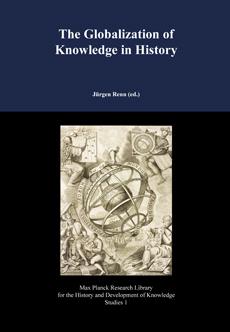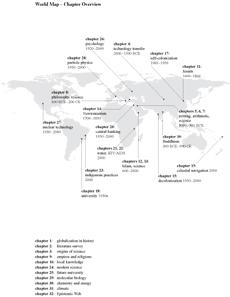The globalization processes of the present refer mainly to the economic processes of the globalization of markets for goods, capital and labor, whereas the global diffusion of technical innovations and bodies of knowledge is often considered a mere consequence of economic, political and cultural processes. But globalization is not just a phenomenon of the present: it may rather be understood as the result of historical processes that already encompass all the dimensions characterizing modern globalization processes, each with its own peculiar constellation of economic, political, technical, cultural and social cohesion. “The Globalization of Knowledge and its Consequences,” a research project of Department I, sets out to explain these processes in terms of historical-epistemological concepts. The first results are presented in The Globalization of Knowledge in History, a recently published volume that aims to diffuse this research in accordance with global demands for open access to scientific information.
Globalization processes involve geographically disparate peoples whose ideas, knowledge, and technologies are disseminated by a variety of means over vast distances. Such long-distance or even intercontinental connections with their attendant spread of knowledge are as old as Homo sapiens themselves but remained accidental and sporadic occurrences for most of human history. Only in the last century or two have such connections taken the form of a continuous, systematic, and self-reinforcing global exchange of knowledge that is becoming a condition for human survival. An epistemic evolution has thus been launched whereby changes in human society are driven by the generation of knowledge. The project The Globalization of Knowledge and its Consequences was launched in 2007 at the 97th Dahlem Conference as an interdisciplinary cooperation that aims at a systematic investigation of the globalization of knowledge by means of comparative research grounded in empirical detail.
As it has turned out, the globalization of knowledge not only constitutes a relatively autonomous process, but profoundly influences all other globalization processes by shaping the identity of its actors as well its critics. Education, for example, is often considered to be a precondition for globalization processes as well as a consequence of their effectuation, but the transmission of knowledge through education is only one—and not necessarily the decisive—type of social interaction to determine the development and diffusion of knowledge. In the past, phases of intense globalization were triggered by challenges such as an unstable equilibrium of population density, the scarcity of nutrition resources, a change in ecological conditions, the emergence of new knowledge and technologies, or shifts in economic and political power structures. One important task of a history of the globalization of knowledge is to identify the bodies of shared knowledge that, during such phases of intense globalization, were crucial for the corresponding diffusion and transformation processes.
The transmission of knowledge can be understood as taking place in an epistemic network in which the nodes constitute possessors or potential possessors of knowledge, such as individuals, groups of artisans or scientific communities, and the links constitute the routes that knowledge must travel to reach from one node to another. Epistemic networks are not random networks, but rather possess a topology in which certain nodes—termed hubs—are especially important in that they are connected to many other nodes. The intrinsic dynamics of knowledge development is characterized by the interaction between knowledge forms and representation structures, triggering processes of reflection that give rise to an increasingly complex knowledge architecture. The extrinsic dynamics is determined by an interplay between epistemic, ecological, cultural, economic and political factors.
Exploring the consequences of a restructuration of a given system of knowledge in a given social and cultural context may reveal intrinsic developments, such as, in the European context, the elaboration of the Aristotelian system of knowledge, and its subsequent transformation into modern science during the early modern period. The transfer of a given system of knowledge in a process of colonization to a new natural and cultural setting, such as the spread of Aristotelianism by missionary and educational activities, may serve as an example for an extrinsic development. Intrinsic and extrinsic developments may be closely intertwined. Their relation will be investigated in a new project initiated in August 2012 “The Spread of Aristotelianism,” which is related to the main globalization project. In cooperation with the Excellence Cluster TOPOI, the various aspects of the system of knowledge known as Aristotelianism will be retraced, looking at the changes it underwent, and at how it was spread and appropriated. Also in relation to the main globalization project, a recent series of discussions was held on the Global Transfer of Knowledge. In four sessions, now published as podcasts, the themes of translation as a mechanism of the global transfer of knowledge, and the role that individuals, institutions and systems play in the exchange of knowledge were debated.

Fig. 2: Cover page of The Globalization of Knowledge in History (Berlin: Edition Open Access, 2012).

Fig. 3: Overview of the chapters of The Globalization of Knowledge in History (Berlin: Edition Open Access, 2012).
With six essays detailing theoretical reflections on processes of globalization of knowledge and twenty-five related case studies, The Globalization of Knowledge in History presents the first results of the main research project. The volume makes use of a core set of concepts that includes a typology of knowledge forms, knowledge representation structures, and knowledge transmission processes. Each of the four parts of the volume addresses historical phases in which the production, transmission and transformation of knowledge were crucial for advancing these processes. Part 1 investigates a series of processes in the very early phases of globalization, from the transmission of practical knowledge to the emergence of science. Part 2 explores how knowledge was disseminated as a consequence of the spread of power and belief structures. Part 3 deals with the encounters between culturally specific knowledge and globalized knowledge. Part 4 is dedicated to the globalization of modern science and to the great challenges, such as energy supply and climate change, that humanity faces when dealing with global knowledge today.
In keeping with the Max Planck Society’s commitment to public access to the output of science, the results of the investigations were published freely in the Edition Open Access. The aim was not only to disseminate the findings as widely as possible, but also to bring recognition to open access publication as a means of collaboration and global knowledge sharing that is unimpeded by a narrow interpretation of intellectual property rights. The volume is presented on a platform with related research and also documents research in flux; it invites other scholars to contribute to the ongoing work and discussions on the globalization of knowledge in history.
